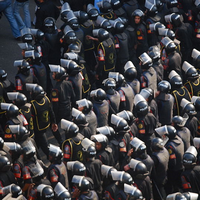In March, the Stimson Center released a report (.pdf) by Gordon Adams and Rebecca Williams reviewing U.S. security assistance programs. Titled "A New Way Forward," the report argued that the United States should restructure its security assistance programs away from "security," as defined in Cold War terms, and toward "governance," which more accurately reflects U.S. interests in the post-War on Terror world. The difference is hardly trivial. "Security" assistance focuses on improving the tactical and operational capabilities of fielded armed forces, whether against domestic or international foes, while "governance" assistance aims to "strengthen state capacity in failing, fragile, collapsing and post-conflict states." Potentially at stake are the resources dedicated to security assistance programs, which involve training, facilitation of doctrinal learning, and very often the transfer of military equipment.
The shift in focus to governance, as well as a number of other reforms proposed by Adams and Williams, is well-considered and, from a U.S. perspective, quite sensible. However, security assistance programs involve both a senior and a junior partner, and for the junior partner such programs are invariably double-edged. Security assistance programs offer small or less-developed countries the opportunity to acquire training, expertise and sometimes equipment at relatively low cost. They also help develop a friendly and productive relationship with the senior partner, which can sometimes be leveraged to good political effect. On the other hand, security assistance programs give the senior partner a direct avenue into the most tightly held bastion of state power. This can lead to any number of problems, not least of which is concern about the loyalty of the armed forces. Furthermore, redefining security assistance programs away from "security" and toward "governance" implicitly threatens the political leadership of the junior partner by suggesting that the state itself, and not merely the watchmen of the state, must be reformed. And while improvements in governance might sound great from the U.S. perspective, the leaders of U.S. partners may be altogether less interested in reforming the way that things are done.
There are plenty of examples of security assistance and partnership programs that went on to create problems for the military and political leadership of the junior partner. After years of collaboration with the Reichswehr at the start of World War II, for instance, many senior officers of the Red Army were accused by Soviet ruler Josef Stalin of being German spies. While the charges were largely groundless, the subsequent purge allowed Stalin to secure his control over the Soviet state. Unfortunately, the executions also did away with a generation's worth of training and expertise in modern warfare. The unification of the Canadian armed forces in 1964 was inspired in part by concerns that the individual branches were cooperating too closely with their American and British counterparts under the auspices of the NATO alliance, and thus becoming detached from the security interests of the Canadian state. Although the Canadian military benefited from integration with NATO, the individual services worked more closely with their foreign partners than with each other. Most recently, some have argued that the ties between the Egyptian army and the United States military may have preserved a line of influence that kept the Egyptian army from cracking down on foes of the Mubarak regime.

